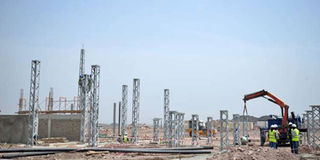Poor capacity for negotiations with foreign investors liability

Construction of the Lake Turkana Wind Power substation project in Laisamis, Marsabit on January 28, 2016. PHOTO | FILE | NATION MEDIA GROUP
What you need to know:
- We granted liberal privileges and concessions without carefully weighing the implications.
- Some of the risks, which some investors take - knowing the type of investment climate we have - is huge.
- A tug of war has erupted between the Ministry of Energy and owners of the Lake Turkana Wind Power over the payment of penalties which the investor is demanding on account of non-performance on the part of the government.
Let’s face it, we are very weak when it comes to capacity at negotiating with foreign investors. Indeed, the history of our dealings with foreign investors is littered with lopsided agreements where we granted liberal privileges and concessions without carefully weighing the implications.
We only start whining about the agreements much later when the chickens have come home to roost - at the point when we belatedly discover that the obligations we signed away were just too onerous.
I make these remarks as an entry point into the disagreements between the Ministry of Energy and the investors behind the 310Mw Lake Turkana Wind Power project in Marsabit. Away from the limelight, a tug of war has erupted between the ministry and the owners of the project over the payment of penalties which the investor is demanding on account of non-performance on the part of the government.
Here is the background to the saga. Lake Turkana Wind Power Project is what we call an Independent Power Producer (IPP) - where an investor comes in with money he has raised from lenders and shareholders to build his own power plant on the understanding that Kenya Power will buy that power under terms and conditions stipulated in an instrument known as a power purchase agreement.
TAKE HUGE RISKS
Indeed, some of the risks, which some investors take - knowing the type of investment climate we have - is huge. What if the only off-taker (in this case Kenya Power) gets broke and cannot either buy or pay for your power after you have spent billions put up a plant?
In the past, Kenya Power did not have a clear record track record of paying IPPs, no lender, or private equity fund was willing to get involved in the power sector.
Indeed, countries like ours that still have investment climate issues hanging on their heads - but who have to compete for capital with other destinations - always find themselves being pushed to offer more incentives and privileges to cover for perceived risks. When you study the trends elsewhere, you find that incentives offered to IPPs are similar across projects and countries.
Today, power purchase agreements signed with IPPs in Tanzania, Uganda, Nigeria or even Ghana - tend to contain very similar arrangements - guarantees, escrow accounts, liquidity facilities and letters of credits for varying amounts and tenures. Invariably, you will also find that investors will have purchased additional insurance cover – the so-called partial risk guarantees (PRGs) from either the World Bank or - lately, from the African Development Bank.
UNABLE TO SELL
Which brings me back to the tiff between the Ministry of Energy and the owners of Lake Turkana Wind Power. Since the transmission lines from the Lake Turkana plant were being built by the government, the investor faced the risk of finding itself unable to sell power because of no infrastructure to transport the commodity to the national grid.
The investors risked finding themselves stranded with turbines and generators installed at a isolated location in Marsabit nearly 500 kilometres from Nairobi – and even more critically- at a point when repayment on loans and equity would have kicked in.
To cover the risk of delays in construction of the transmission line, it was decided that the project be to de-risked by introducing a penalty called a “deemed generated energy payment”.
In signing the agreement - the government committed that in the event that the power plant was completed before the transmission line and the plant found itself idle - they would meet costs facing the investor, including the payments to the lenders, which would have naturally kicked in at that stage.
The government also purchased a partial risk guarantee facility from the African Development Bank to give additional cover for delays. The point, therefore, is this?
DELAYS IN CONSTRUCTION
The Energy ministry should not even pretend that it can wiggle out of the consequences of the obligations it signed because of delays in construction. I hear them when it argues that Lake Turkana is yet to install some of the equipment.
However, the point must be made that decision whether the power plant is complete or not is neither the ministry nor Kenya Power’s to unilaterally make.
The international and independent consultant on the project, Messrs Mott Macdonald, has already expressed itself on the state of completion of the power plant.
Yet nobody can right now vouch when the transmission line will be completed. It is an open secret that Isolux, the Spanish contractor building the transmission line is facing serious financial difficulties.
The fate of the project has implications for both our investment grade rating and our relations with international lending institutions, especially the ADB. We cannot run away from obligations and commitments we made.




